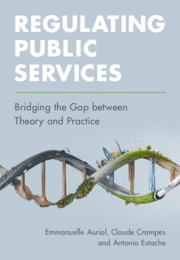Book contents
- Reviews
- Regulating Public Services
- Regulating Public Services
- Copyright page
- Contents
- Figures
- Tables
- Boxes
- Foreword
- Preface
- Acknowledgements
- Symbols
- Abbreviations
- 1 Introduction
- 2 Defining a Theoretical Normative Benchmark
- 3 Thinking Like a Monopoly about Price and Output
- 4 Regulating a Monopoly with Full Information
- 5 Regulating under Informational Constraints
- 6 Regulatory Rules to Set the Average Price
- 7 Linking Regulatory Theory to Practice through Finance
- 8 Non-Linear Pricing in Regulation
- 9 Social Concerns in Regulatory Design
- 10 Regulating Quality
- 11 On the Regulation of Investment
- 12 Regulating Multi-Product Oligopolies
- 13 Abuse of Market Power in (De)Regulated Industries
- 14 On the Relevance of Institutional Quality
- 15 Emerging Regulatory Challenges
- Bibliography
- Index
15 - Emerging Regulatory Challenges
Published online by Cambridge University Press: 27 January 2022
- Reviews
- Regulating Public Services
- Regulating Public Services
- Copyright page
- Contents
- Figures
- Tables
- Boxes
- Foreword
- Preface
- Acknowledgements
- Symbols
- Abbreviations
- 1 Introduction
- 2 Defining a Theoretical Normative Benchmark
- 3 Thinking Like a Monopoly about Price and Output
- 4 Regulating a Monopoly with Full Information
- 5 Regulating under Informational Constraints
- 6 Regulatory Rules to Set the Average Price
- 7 Linking Regulatory Theory to Practice through Finance
- 8 Non-Linear Pricing in Regulation
- 9 Social Concerns in Regulatory Design
- 10 Regulating Quality
- 11 On the Regulation of Investment
- 12 Regulating Multi-Product Oligopolies
- 13 Abuse of Market Power in (De)Regulated Industries
- 14 On the Relevance of Institutional Quality
- 15 Emerging Regulatory Challenges
- Bibliography
- Index
Summary
The environmental concern and its social side effects will be at the core of regulatory authorities’ agenda on top of short-term efficiency objectives in the foreseeable future. The steady growth of ‘big data’, of digitalization and of the new data-processing technologies will change the way firms and governments use and share information in the design, compliance and enforcement of regulation. The institutional environment of regulation will need to evolve to correct institutional mistakes of the past and to internalize the impact of the data revolution on the distribution of regulatory mandates across agencies and across sectors within countries and across countries. Non-traditional financial actors will press regulators to internalize more systematically financial markets’ concerns in the design of regulation in exchange for their willingness to help close the financing gap of many regulated industries. Keeping the right balance between the return-on-investment objectives of non-traditional financial actors, investment targets, users’ needs and taxpayers’ benefit is a challenge for the regulators of the future. Tools emerging from applied research in behavioural economics will offer new alternative regulatory tools to improve the effectiveness and targeting of regulation.
Keywords
- Type
- Chapter
- Information
- Regulating Public ServicesBridging the Gap between Theory and Practice, pp. 362 - 389Publisher: Cambridge University PressPrint publication year: 2021

